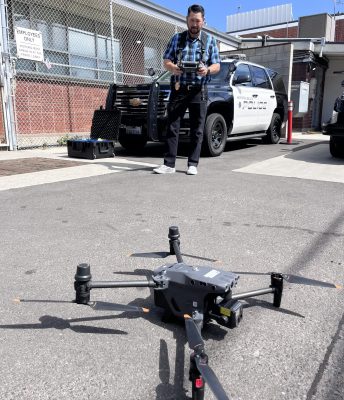“Think off the page – the music doesn’t live on the paper”
by Stacey A. Morse
“My parents wanted me to be an engineer,” says Deborah Wicks La Puma. Luckily, she followed her musical muse instead, and became a composer, music director, and arranger.
It began with the musical comedy “One Bad Apple,” La Puma’s Gospel-musical theatre thesis production at Stanford. Deborah’s then-sweetheart and husband-to-be, Christopher La Puma, worked with Raphe Beck to create the libretto for Deborah’s entry into the musical theatre world. Deborah Wicks La Puma tickled the ivories and never looked back.
Since then, she has received the Jane Chambers Playwriting Award, the Robert M. Golden Award, a National Endowment for the Arts’ New American Works Grant, two Helen Hayes nominations, two Parent’s Choice Awards, and an iParenting media award.

Living through music
Deborah’s inventory of productions reads like a well-rounded life well lived, which is saying something for someone with barely 40 candles on her cake. From more traditional musical-theatre styles, such as “Prometheus Bound,” a musical built on the play by Aeschylus and first performed (appropriately enough) in Washington DC (2002), to Rock-based “Einstein is a Dummy” (Atlanta, GA in 2005), and Flamenco-scored “Ferdinand the Bull,” a bilingual musical based on the classic book by Munro Leaf, composer La Puma flexes her musical and story-telling skills at every turn, understanding that it is the tale well told that carries a good musical, as much as the melody and baseline beat.
When speaking of the stories behind the shows, this acclaimed artist overflows with enthusiasm, as if each work is as much a child of her heart as the three musical girls she and Christopher have nurtured. La Puma writes both adult and youth musical theatre, and it seems that all the characters she works with are reflective and insightful, as well as fun.
“PetPourri” premiered at the Olney theatre in Maryland (2004). Directed by Tony-Award winner Michael Rupert, with a libretto by Andy Dodds, the cabaret/musical theatre score shows how peoples’ true nature is revealed by their pets. The rocking “Einstein is a Dummy,” follows a fictional day in the life of 12-year-old Albert. A ’70s-Rock-scored musical, “Looking for Roberto Clemente,” is written from the perspective of the kids who idolized this baseball great and humanitarian. “Nobody’s Perfect,” is based on the book by actress Marlee Matlin. It sports a large youth cast, a libretto by L.A. resident Doug Cooney, and had its 2007 premiere at the John F. Kennedy Center in Washington DC. Most recently, it was shown at the Norris Center for the Performing Arts in Rolling Hills Estates. La Puma enjoyed the decisions of Debbie Martinez at the Norris Theatre to perform ‘Einstein is a Dummy’ and ‘Nobody’s Perfect’ by recreating what was originally written for a small adult cast into a large youth-centered musical.
Of course, a composer needs a good librettist (who writes the book and lyrics); they go together like sea and shore. Ms. La Puma feels lucky to be able to work with multiple librettists. “I don’t feel like I get into a writing rut, [since I’m] constantly having to mix with other people and other styles.”
Composition fit for a Queen
“Einstein said, ‘Imagination is more important than knowledge,’” says La Puma, so she imagines what it would feel like to be a pacifist bull, in that bilingual Flamenco production. “Cinderella Eats Rice and Beans: A Salsa FairyTale” boasts a Puerto Rican heroine, a Salsa and Hip-Hop score, and focuses on conflict resolution, rather than finding a fairytale prince. “Walking the Winds: Arabian Tales,” has a hybrid Arabic and musical theatre score. The tale within the tale: La Puma flew to Amman, Jordan, to be in Residency there, and hold a workshop with Jordanian children. “We had a crash course in Arabic music, and developed the piece there,” she says. In addition to the creation of this production, La Puma was honored to meet the “beautiful and gracious” Queen Noor. “It was like a cultural bridge,” explains La Puma. Performed at the Kennedy Center (2006), the score was co-composed with Jordanian composers and Arabic playwrights in collaboration with the Royal Jordanian Performing Arts Center in Amman .
Bicultural and multilingual
If you’re sensing a theme, you’re right. As a dual citizen of Mexico and the U.S., La Puma knows what it’s like to walk in more than one world, at times more a part of one or the other. “I was a Navy Brat,” she explains. Her father, Guy, served in the Navy for 25 years, and she lived most of her childhood in Brazil and Portugal. Her mother, Deanna, like her mother’s mother, worked at the Library of Congress in Rio de Janiero.
Because of her early travels, La Puma speaks Spanish and Portuguese fluently, as well as a mixture of both, called Portuñol. In addition to her Stanford BA in Music, with a focus in Competition and Vocal Performance, she earned an MFA degree in Musical Theatre Writing from NYU’s Tisch School of the Arts. La Puma then studied Mexican folk and indigenous music with musicologist Alfredo Lopez at La Universidad de Baja California, Mexico .
“I love my job,” says La Puma. “I write rock and roll, and then a hip-hop score, and then a Greek chorus followed by a Gospel score. …I think it must be harder to be a songwriter looking for the next hit tune, than working in these dramatic situations.”
When she’s not juggling notes and composing pieces, with her rescued Tuxedo-cat “Mimi” on the piano for company (“my little helper”), Deborah sings at Saint John Fisher Catholic Church where she occasionally substitutes as liturgical minister, and pianist. She volunteers at the library at Point Vicente Elementary – like mother, like daughter. Deborah also enjoys “running, and biking, and driving my children all over the hill!”
Recent/current productions
A production of “Frida Libre,” loosely based on the young life of Mexican painter Frida Kahlo, toured this spring and was viewed by more than 17,000 school children in San Diego. Another production of “Frida” has just opened at the La Jolla playhouse. For this, La Puma teamed with librettist Karen Zacarias to create a contemporary Lyric/Latino score.
Next spring, South Coast Repertory will offer another Zacarias/La Puma production: “Jane of the Jungle,” about what happens when an ordinary girl wakes one morning to find that she has spots, furry ears, and a tail. “A metaphor for puberty,” explains La Puma, this show promises to be entertaining as well as insightful. “The children and family shows have a message, but not a heavy handed one,” she adds. “Young audiences are smart, and know when you’re trying to feed them a line. …They’re not as forgiving as adult audiences,” she laughs.
This fall, catch a reading of “The Bell Witch” – about a poltergeist during the Civil War – at the Boston Court theatre in Pasadena. By Los Angeles playwright Tom Jacobson, it is La Puma’s “first scary show!” and is not for children, nor the faint of heart.
And the beat goes on…
The La Pumas have passed their musical genes and love of the lyrical to the next generation; all three play instruments. As of this writing, the eldest, Virginia Rose (15), plays viola in the PVHS orchestra, and plays electric violin in the St. John Fisher Teen Choir. Julia (12) plays bassoon in the PVIS wind ensemble, as well as oboe and piano. Cecelia, the youngest, at 9, is in the third grade at Point Vicente Elementary, and was off to what is affectionately known as “cello camp.” Virginia Rose gets 2 names because of the family tradition of giving the name “Virginia ” to the first born girl in each generation, then, to forestall confusion, the middle name is different. “Rosie” is at least the fourth generation in this tradition.
Deborah started at a young age, as well. While her siblings Arthur and Virginia also took piano lessons, “I wanted to kick my sister off the bench,” she admits, “I wanted to be the one playing.” Deborah is the only one who stuck with the piano, she notes. But it was young Debbie’s high school teacher in Portugal who taught her how to improvise. “Mr. Leventhal said to think about the music beyond the dots on the page,” she recalls. “Think off the page – the music doesn’t live on the paper. It’s not trapped on the page. Make it new every time.” And she does.
Oh, and good news: Her folks have forgiven her for the whole engineer thing.










